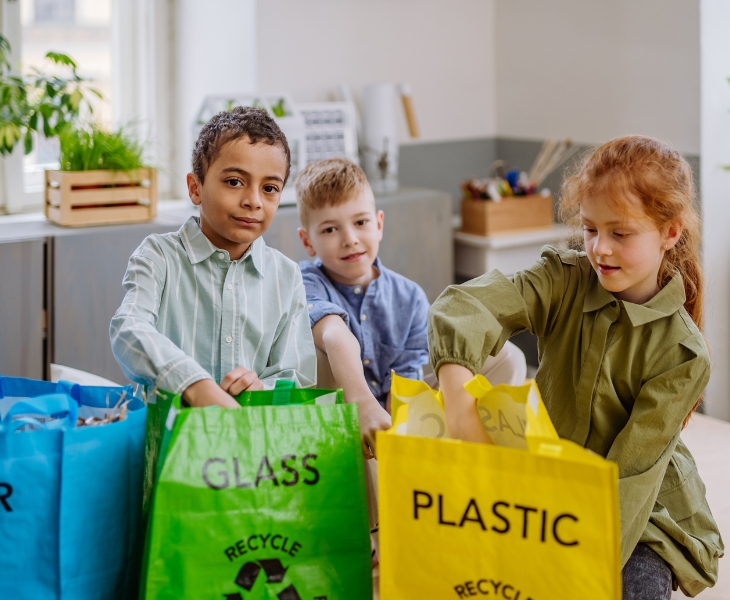Plastic pollution has become a significant environmental concern, with its far-reaching impact on ecosystems, wildlife, and human health. As we work towards building a sustainable future, it is essential to actively engage and empower children to address the growing problem. By empowering young students with knowledge and fostering a sense of responsibility, we can cultivate a generation that takes meaningful action to reduce plastic waste in schools and beyond.
Encouraging children to minimise plastic waste in school goes beyond basic sustainability education, as it requires creating a positive and engaging environment that cultivates a culture of mindful choices and active involvement in waste reduction.
While schools are taking significant steps to mitigate plastic waste, it can be challenging to uphold commitment during the bustling back-to-school season when convenience often overshadows eco-friendly practices. However, there are several strategies that can help maintain these habits despite the demands of a hectic school schedule.
Reducing Plastic Packaging
Plastic packaging poses a significant waste issue in Australia, with the country producing around 2.4 million tonnes of plastic packaging waste in 2018-2019, according to the Australian Packaging Covenant Organisation (APCO). The growing volume of plastic packaging is evident in various aspects of daily life, from groceries delivered in plastic bags to products covered in bubble wrap and shipped in plastic mailers.
Buying Recycled Supplies
Schools can contribute to waste reduction and resource conservation by opting for recycled products and packaging. By furnishing classrooms, libraries, and common areas with durable furniture made from recycled plastic materials, such as desks, chairs, and tables. Exploring art supplies and stationery made from recycled plastic, like coloured pencils, pencils, markers, scissors, folders, and paintbrushes, not only encourages student creativity but also promotes sustainability in the classroom. It is recommended to source these items from distributors affiliated with the Australian Packaging Covenant Organisation (APCO), which strives for 100% recyclable, compostable, or reusable packaging by 2025 while aiming to eliminate single-use plastic packaging.
Establish Recycling and Composting Stations
Implement a well-structured recycling program within the school premises. Place clearly labelled recycling bins throughout the campus to facilitate proper waste segregation. Educate students about the different types of recyclable materials and the correct disposal methods. Additionally, introduce composting initiatives to reduce food waste and educate students about the benefits of composting. Set up compost bins in the school cafeteria or establish a composting area in the school garden.
Plastic-Free Events and Campaigns
Schools can organise plastic-free events and campaigns to raise awareness and actively involve students in reducing plastic waste. For example, you can host a “Plastic-Free Week” where students and staff commit to avoiding single-use plastics for the entire week. This initiative can include educational sessions, workshops, and activities highlighting the impact of plastic waste and encouraging sustainable alternatives.
Sustainable Cafeteria Practices
Schools can focus on reducing plastic waste in their cafeterias by implementing sustainable practices. This can include providing reusable cutlery, plates, and cups for students and staff. Schools can also collaborate with local food suppliers to deliver meals in bulk, reducing packaging waste. Additionally, encouraging the consumption of fresh, unpackaged foods can reduce the need for single-use plastic wrappers and containers.
Engage Students in Hands-On Projects
Empower students to actively participate in reducing plastic waste through hands-on projects like fun worksheets to get them involved. You can also engage students by designing and implementing campaigns promoting reusable bags or organise plastic-free events. Such projects foster creativity, critical thinking, and a sense of ownership in reducing plastic waste. You can also involve students in some craft activities that require little material, click here to view our craft project on fun and creative ways to upcycle plastic waste.
Lastly, Check your Printer Paper
Printing costs are one of the most significant expenses for schools. The average school will spend between $30,000 and $50,000 on paper alone each year, using about 6 million sheets of paper. That is before you include in the cost of printing consumables like equipment and toner. Choosing the right paper can make a significant difference. Opting for lighter paper stocks like Opti New Future instead of heavy-duty options to minimise waste. Some paper wrappers are not recyclable, so choose paper with recyclable or biodegradable wrapping whenever possible. When heavier paper is necessary, opt for recycled options. COS premium paper, for instance, is committed to eliminating single-use packaging and minimizing environmental impact. They ship their premium paper in boxes that don’t require plastic strapping, preventing over 700,000 plastic straps from ending up in landfill each year.


